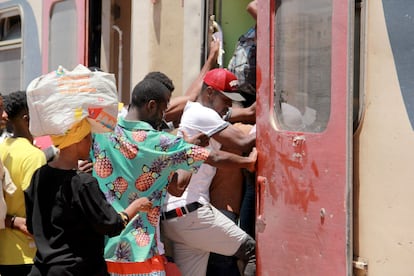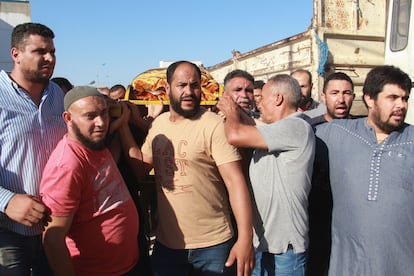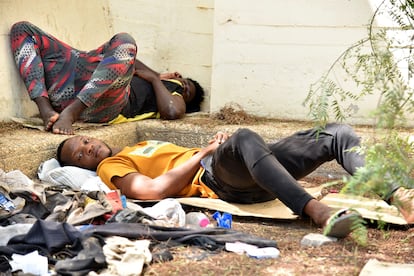Tunisia banishes scores of sub-Saharan Africans to the desert after an outbreak of racial violence
The death of a Tunisian stabbed in a brawl in the port city of Sfax unleashes a wave of harassment of West African migrants trying to reach Europe by boat

Bottled-up pressure in Sfax (located 270 kilometers [about 168 miles] south of Tunisia’s capital), the epicenter of irregular migration in the central Mediterranean, erupted with tinges of discrimination against thousands of sub-Saharan Africans. The Tunisian authorities expelled dozens of West African migrants from the port city to a desert area on the border with Libya following a wave of violence in which a Tunisian national was stabbed to death on Monday, local human rights NGOs reported on Wednesday night. Many of the more than 10,000 sub-Saharan Africans waiting in Sfax to board a boat for the Italian coast have regrouped at the railway station to try to escape a city taken over by security forces amid a climate of increasing harassment of black Africans.
The NGO Tunisian Forum for Economic and Social Rights (FTDES) and two dozen other organizations that closely follow migration issues have reported that a hundred migrants and refugees from Ivory Coast, Cameroon, Mali, Chad and Guinea-Conakry, including women and minors, were expelled from the city to Ben Gardane, a desert area bordering Libya, on Wednesday. The displaced, whom the police rounded up at the Sfax fairgrounds, have complained of mistreatment, theft of their money and destruction of their cell phones. Another 50 sub-Saharan Africans had already been transferred to the same area over the weekend.

Hundreds of the coastal city’s residents have organized to guard their neighborhoods and demand the immediate departure of irregular migrants in protest of the death of a 41-year-old Tunisian who was stabbed in a clash with sub-Saharan Africans, France Presse reports. Neighborhood patrols have set up barricades and burned tires to close access to their districts. Social media has also been awash with images of police raids to expel migrants from their homes amid applause from neighbors (the authenticity of these photos could not be independently verified). Other recordings show sub-Saharan Africans lying on the ground, surrounded by people armed with sticks, and there are reports that dozens of wounded black Africans have been admitted to the hospital.
Tension between the inhabitants of Sfax and sub-Saharan African migrants had previously surfaced last May, when a Beninese man died in hospital after being stabbed by seven Tunisians. Himma Hamad, the director of immigration at the Sfax branch of the Tunisian League for Human Rights, told EL PAÍS that she had received dozens of complaints about assaults on sub-Saharan African migrants following a “xenophobic” speech Tunisian President Kais Said gave last February; he now governs by decree after having dissolved Parliament two years ago. Said described the presence of tens of thousands of sub-Saharan Africans—there are between 20,000 and 40,000, according to sources—among the country’s 11 million inhabitants as “hordes that pose a demographic threat to Tunisia’s Arab identity.”
On Tuesday, the president once again insisted that Tunisia “will not accept those who do not respect the law in its territory " and that the full weight of justice will also be brought to bear on those who “host illegal migrants in their homes, rent to them or offer them work.” The Tunisian League for Human Rights points out that in addition to experiencing social harassment and labor exploitation, sub-Saharan Africans’ salaries are two-thirds less than what Tunisians earn, and in Sfax they live under the constant threat of being evicted from their homes.
President Said also warned that Tunisia refuses to become “a country of transit to Europe or of resettlement of citizens from some African countries.” Last month, the European Union offered the country a contribution of more than €1 billion ($1,096,695,000) in aid to stem the flow of small boats from Tunisian shores to Italy. President of the European Commission Ursula von der Leyen, Italian Prime Minister Giorgia Meloni, and Dutch Prime Minister Mark Rutte traveled to the Tunisian capital, promising to help the country tackle the reforms demanded by the International Monetary Fund in exchange for a financial rescue plan that entails high social and employment costs.

Faced with the massive arrival of migrants in makeshift boats from Tunisia to the Italian coast, especially to the island of Lampedusa, the EU has offered a package of €105 million ($115,152,975)—triple the annual funding of the last two years—for border control programs, searches and the return of irregular migrants. The General Union of Tunisian Workers (UGTT), the country’s largest union, has blamed the Tunisian president for aggravating the migration situation by agreeing to become “the gendarme of the Mediterranean,” and by systematically intercepting irregular migrant boats to drive them to the port of Sfax.
In the first four months of 2023, nearly 19,000 migrant interceptions were recorded on the route to Italy; they represented 82% of the ones in 2022. Amid the blockade on the Moroccan, Algerian and Libyan coasts, Tunisia is now the main escape valve for African migratory pressure across the Mediterranean to Europe. The 100 kilometers (about 62 miles) of coastline between Sfax and Mahdia (in the north) account for almost 75% of the boat departures from Tunisia. Located less than 200 kilometers (about 124 miles) from Sfax—half a day’s sail with a small outboard motor—the Italian island of Lampedusa is the gateway to Europe for the thousands of sub-Saharan Africans arriving off the coast of Tunisia.
Sign up for our weekly newsletter to get more English-language news coverage from EL PAÍS USA Edition
Tu suscripción se está usando en otro dispositivo
¿Quieres añadir otro usuario a tu suscripción?
Si continúas leyendo en este dispositivo, no se podrá leer en el otro.
FlechaTu suscripción se está usando en otro dispositivo y solo puedes acceder a EL PAÍS desde un dispositivo a la vez.
Si quieres compartir tu cuenta, cambia tu suscripción a la modalidad Premium, así podrás añadir otro usuario. Cada uno accederá con su propia cuenta de email, lo que os permitirá personalizar vuestra experiencia en EL PAÍS.
¿Tienes una suscripción de empresa? Accede aquí para contratar más cuentas.
En el caso de no saber quién está usando tu cuenta, te recomendamos cambiar tu contraseña aquí.
Si decides continuar compartiendo tu cuenta, este mensaje se mostrará en tu dispositivo y en el de la otra persona que está usando tu cuenta de forma indefinida, afectando a tu experiencia de lectura. Puedes consultar aquí los términos y condiciones de la suscripción digital.









































